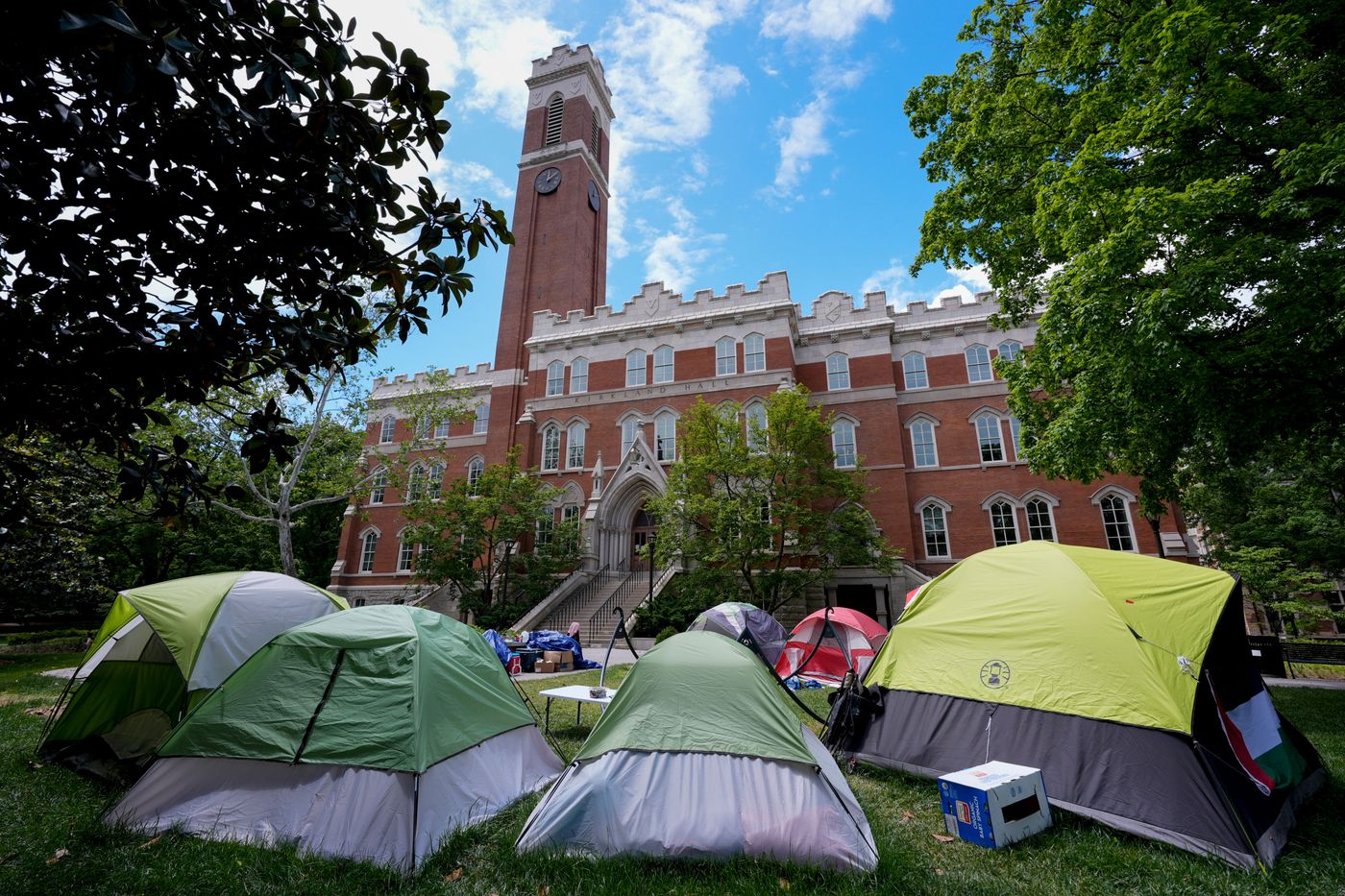[ad_1]

When Devron Burks wrote their admissions essay for Vanderbilt University, they told the story of how, in junior high, they supported a trans classmate who wanted to run for prom king even though many students, teachers, and the administration were against it. Burks sketched plans to continue that advocacy in college, in line with their “view that marginalized people deserve to feel safe and feel comfortable in this world.” So when Burks, now a senior at Vanderbilt, was arrested for alleged assault and subsequently expelled after joining about two dozen other students in a March sit-in to divest from Israel’s war in Gaza, they were disappointed. “I thought that this university accepted me because I am an advocate, because I am someone who will fight for what they believe in, no matter what,” they say. Burks has no idea if they’ll receive a diploma but doesn’t regret protesting. “If I end up having to forfeit the graduation that I thought I needed,” they explain, “I don’t really care because I did what I did out of love.”
Since mid-April, police have reportedly arrested more than 2,500 people in protests at more than 50 schools nationwide. Most of these actions have focused on divestment: Participants want their institutions to sever their relationships with Israel and with companies helping to fund the brutal assault on Gaza. With graduation ceremonies fast approaching, many student activists now find themselves banned from campus, suspended, and even expelled. Will they be allowed to walk at commencement? Will they ever see their degrees? I interviewed five seniors facing disciplinary action, who weren’t too concerned with their own punishments when, as several pointed out, the IDF has not left a single university standing in Gaza. (Their schools declined to respond to questions about whether disciplined students will receive their degrees.)
“I have spent a few good years working toward this degree. My family was excited to see me walk and graduate,” says Jane, a University of Georgia senior who asked to use a pseudonym. Jane was placed on interim suspension — meaning she can’t be on campus or participate in graduation — after allegedly trespassing during a protest on her public university’s lawn. “But I can’t say that this is a heartbreaking experience for me, when there are over 30,000 dead Gazans who were living under Israeli apartheid for so long. I think it would be silly to care about a piece of paper from an institution that refuses to acknowledge its complicity in genocide.”
If it’s a choice between sitting outside in the hot sun and watching some celebrity talk for an hour versus standing up against the genocide, it’s not even a question.
– Lauren, a senior at the University of Georgia
Sara Ryave, a Princeton University senior who was banned from campus and commencement after allegedly trespassing during an April sit-in, says she understood the possible consequences of protesting in an administrative building. But she felt that the urgency of the cause trumped the risks. “What we’re doing is such an infinitely small sacrifice compared to what people in Palestine are dealing with,” she says. “We’re not here just to make a statement about what free speech is; we’re here to be heard by the university and to move to divest.” In her view, students nationwide have escalated from campus-sanctioned protest methods to encampments and occupations because “no university is willing to actually have us at the table.”
The students I spoke with all had the same complaint: That they tried, for months, to get administrators to sit down with them by operating within their school’s protest guidelines. But ultimately, “What’s the point of protesting with permits?” wonders Lauren, another suspended University of Georgia senior who asked to use only her first name to avoid further retaliation. Organizers tried demonstrating inside the school’s designated “free-speech zones,” she explains; they spent seven months pushing for meetings with the university’s president but were purportedly rebuffed — even as he met with the school’s Hillel chapter. Ultimately, in its messaging on the arrests, UGA claimed that the students who set up an encampment “chose to be arrested” when they declined to make a reservation for their demonstration in line with school policy. “In a certain sense,” Lauren says, that “is true — everyone was prepared for the consequences. But at the same time, we were just standing around on a lawn.” For that, she’ll miss gathering with her classmates for a second time. “I graduated high school in 2020, so I didn’t have an in-person graduation then,” she says. “But I mean, if it’s a choice between sitting outside in the hot sun and watching some celebrity talk for an hour versus standing up against the genocide, it’s not even a question.”
These students departed from the “‘proper channels of speech and communication,” as Princeton senior Brooklyn Northcross explains it, because those didn’t get them anywhere. “What else can we do when they won’t even have a meeting with us?” wonders Northcross, who was arrested for trespassing alongside Ryave and is currently subject to a campus ban. They may have put four years of work and tuition fees, as well as their degrees, on the line to do it, but the hope was that they might finally get their institutions’ attention. After all, meeting protest with force is a choice: Universities including Brown, Northwestern, and Rutgers opted to listen to student organizers and initiate negotiations rather than call in police to sweep them off their lawns. Those schools are offering a degree of amnesty to demonstrators, rebuilding trust between the student body and the administration. Schools that squash dissent, by contrast, are erasing whatever confidence students might have that their administrators will hear them out, support them, and keep them safe. “We saw it on our TV screen; the students at Columbia and students at other universities were being arrested,” says Jane. “But you never expect your own university to call up the cops on you and call you a danger to campus.”

Since Burks’s expulsion, they say they haven’t been able to step foot on campus except for approved classes or doctors’ appointments, and only then with prior, timestamped permission. A security escort must go with them to grab things from their dorm room, ostensibly because their participation in a sit-in — where they say students sat around reading, chanting, and doing homework for 22 hours — makes them a danger to their peers. From Burks’s perspective, it seems like administrators want to send a message: “We have this power and control, and we’re going to make sure you understand that it will be levied against you.”
That attitude stands at odds with what some of these students are learning. As an African American–studies major, Northcross has “spent the last four years studying freedom, liberation, and all these different movements for equality throughout history,” she explains. “It felt like an injustice to what we were studying to sit back in this moment and not be able to use our privilege as students, as seniors at this university, for something we all really cared about. There’s a genocide happening overseas, and Princeton to this point has refused to speak out or even condemn it. So it’s like, If not now, when, and if not us, who?”
The calculation about whether or not to participate was a personal one for every student. Some, Northcross says, opted out in deference to “what their parents sacrificed for them to be at Princeton.” She understands that, too: “My parents have put so much on the line for me to be where I am,” she says. “They sacrificed for me to be who I want to be, for me to make my voice heard, to do what I want to do on this planet. I feel like, if anything, that’s the most respect that I can show to my parents: to take the platform that they have given to me and use it for something I care so deeply about.” Still, she was nervous to call them and break the news of her arrest. Initially they had some questions — “are you going to graduate,” what’s going to happen with this?” — but the conversation ultimately went well. “My dad just comes out of a long line of Black freedom struggle in America, and my mom — her parents immigrated to America for a similar reason,” she explains. “At the end of the day, they’re so proud of me.”
Burks says their parents have also been incredibly supportive. “They ask me questions about Palestine; we have conversations about biased news coverage,” they say. “Of course they are worried for me, but I think they are also proud of me and inspired to learn.” Although Burks is appealing their expulsion, they received an email from the school on Monday informing them that the matter wouldn’t be resolved by graduation on Friday. “They will not allow me to walk across the stage, even if I sent a picture of both my pinkies crossed that I wouldn’t do anything more to disrupt in any way.” Instead, they will be having a mock-graduation party with their family, who, they say, “are still celebrating my success.” Burks hopes to work and stay in Nashville for the next year regardless of what happens with their degree. And after that? They want to go back to school.
[ad_2]
Claire Lampen , 2024-05-08 19:30:46
Source link


